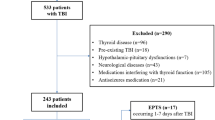Abstract
Purpose:
To clarify the association between disturbed thyroid hormone metabolism (low T3 syndrome) and release of cytokines and markers of cell-mediated immune response.
Material and Methods:
Concentrations of cytokines as well as of thyroid hormones were determined in 32 patients suffering from severe traumatic brain injury: interleukin-( IL-)1, IL-6, IL-10, tumor necrosis factor, transforming growth factor-(TGF-)β, soluble interleukin-2 receptor (sIL-2R), neopterin, and β2-microglobulin (β2m) in serum and cerebrospinal fluid; triiodothyronine (T3), free T3, thyroxine (T4), free T4, thyrotropin, thyroxine-binding globulin, and albumin in serum. Additionally, clinical parameters were assessed: Glasgow Coma Score, CT scan, intracranial pressure, Glasgow Outcome Score, and occurrence of pneumonia.
Results:
Among 31 patients with a low T3 syndrome, those with additional low serum T4 levels (n = 13) showed a prolonged suppression of serum β2m, neopterin, and sIL-2R, and a higher secondary increase of serum β2m, neopterin, and TGF-β, as well as lower T3 levels (all p < 0.05). These patients also had a longer stay in the intensive care unit (34 ± 6 days vs. 22 ± 12 days; p = 0.008). Increased levels of β2m correlated with a preceding decrease of thyrotropin (cerebrospinal fluid: r = –0.53; p = 0.004; serum: r = –0.41; p = 0.029). Associations of thyroid hormone metabolism with either other cytokines or with clinical parameters were not detected.
Conclusion:
These results show that low T3 syndrome is a very common pathophysiological feature after severe traumatic brain injury. The association of a low T3 syndrome in combination with low serum T4 levels, with an altered time course of markers of cell-mediated immunity led the authors to hypothesize that a disturbed thyroid hormone metabolism may be interrelated with a prolonged cellular immune dysfunction after traumatic brain injury.
Similar content being viewed by others
Author information
Authors and Affiliations
Corresponding author
Additional information
* Both authors contributed egually to the paper,
Rights and permissions
About this article
Cite this article
Hans*, V.H., Lenzlinger*, P.M., Joller-Jemelka, H.I. et al. Low T3 Syndrome in Head-Injured Patients is Associated with Prolonged Suppression of Markers of Cell-Mediated Immune Response. Eur J Trauma 31, 359–368 (2005). https://doi.org/10.1007/s00068-005-2068-y
Received:
Accepted:
Issue Date:
DOI: https://doi.org/10.1007/s00068-005-2068-y




